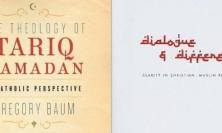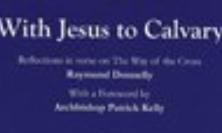At some time in our lives, we have all asked the question that Australian Jesuit Richard Leonard poses in the title of his new book. He describes how one memorable conversation at 35,000 feet inspired him to address the uncertainties about faith that so many young people have today, including the biggest one of all: what are we doing on earth for Christ’s sake?
Depending on your point of view and experience, you might judge that I have been blessed or cursed to do a lot of flying in my ministry as a Jesuit priest. Generally I enjoy it, but I choose to fly under the radar (pardon the pun!); I rarely wear clerical dress on a plane, not least because Australian domestic and international flights are among the longest in the world and clerical collars are uncomfortable. These days, too, that collar repels as many people as it attracts, and indeed in secular Australia it can invite unwarranted attention from some who have no desire for a conversation but simply want to spew forth bile on me.
Nonetheless, even when travelling in mufti, before I can get my earphones firmly inserted in my ears a fellow chatty traveller sometimes asks, ‘What do you do for a living?’ St Ignatius Loyola was very keen on the art of the spiritual conversation, and so am I, but not in the sky. Ignatius knew nothing about 17 hours in economy class on a plane!
Of all the conversations I have had on planes, however, one of the most memorable led to this book. I was flying from New York City to Los Angeles and as I settled into row 44, the very friendly young man next to me asked me what I did. I told him. He said had been a Catholic. I noted his emphasis was on the past tense, but said nothing. He wasn’t sure about anything to do with faith and spirituality. I told him I was a Jesuit, which led him to tell me he had recently read two books by a Jesuit priest: Where the Hell is God? and Why Bother Praying? ‘Do you know them?’ he asked. I looked around for the candid camera. ‘Yes, I know them very well – I wrote them.’ He would not believe me until I showed him my business card. This scene was unbelievable.
Thomas and I had a long and engaging conversation about the issues my two books had raised for him, and for me. Tom, 30, was a highly educated person, an Ivy League graduate. He was also a serious humanitarian, working in third world countries for Habitat for Humanity during several summer holidays. His wrestling with belief, theology, prayer and the problem of evil came out of personal experiences. He told me that as much as he liked my earlier books and found them accessible and helpful, they did not address a fundamental issue for him and most of his friends: the why of belief. ‘We just get worn down by the growing chorus of people who say “religion is all nuts and you can be a good person and make a difference in the world and not believe anything more than that” … And to say the Catholic Church has made it very easy to leave in recent years is an understatement … I guess what I am struggling with is what are we actually doing on earth for Christ’s sake?’ As soon as Tom said ‘for Christ’s sake’ he apologised, fearing he had offended me by swearing. Not at all! Everything that every baptised person does is meant to be ‘for Christ’s sake’.
I got off that plane knowing I had a new book to write and already had the title!
What are we doing on earth for Christ’s sake? offers some gentle and respectful answers to the questions posed by modern secular culture and especially by our detractors, whose voices are louder than ever. I want to answer some of the major concerns some of our young people have about faith, religion and the Church. And I offer some hopeful way forward in the face of sobering times.
The first third of the book looks at various aspects of the belief and unbelief debate:
· There is common ground between believers and non-believers: most people want many of the same things for the world – kindness, truthfulness, care for the earth, justice, peace and love, just to name a few.
· Dialogue with atheists can be clarifying, challenging us to greater clarity in our thinking, demanding rationality in our belief, seeking the case for why religious groups should have influence over social policy and law, and placing the spotlight on whether we practise what we preach.
· In pluralistic democracies Christians should not only defend religious freedom but the freedom not to believe anything. They are two sides of the same coin. Atheists and agnostics have a right to disagree with everything we hold to be true, but all conversations in the debate about belief and unbelief should be marked by dignity and respect.
· Christians are not all the same. For a very important start, most of the world’s Christians do not, for example – at least officially, anyway – take the Bible literally.
· At the same time, not all atheists are the same. Nick Spencer in Atheists: the Origin of the Species argues that we should talk of ‘atheisms rather than atheism.’ We should know where our critics are coming from. For their part, atheists may not like it but religion is back in the public square – big time.
· We do not have to choose between religion and science. Science asks how we came to be here; faith asks why we are here. Science looks at the mechanics; faith addresses meaning. I am respectful of those who do not need to address issues of meaning outside their own existence within the natural order, but I am not one of them.
· Within the arguments from science for belief in God, I explore balance, detail, complexity and synchronicity. While others are entitled to believe we emerged from randomness, I am not the only one who is making a leap of faith in this discussion. As Eric Metaxas says, ‘the odds against the universe existing are so heart-stoppingly astronomical that the notion that it all “just happened” defies common sense.’
· While we have become used to being told we believe in ‘imaginary friends’, religious experience indicates that there are different ways for human beings to know things. In this regard, matters spiritual and religious are akin to love, forgiveness, beauty and conscience. These primal human experiences are real, powerful and determinative because we have experienced them.
· We believers are not exactly alone. Though appeals to numbers can be a fallacy, of the 7.02 billion people in the world 31.6% are Christian, 23% Muslim, 15% Hindu, 7% Buddhist or Sikh, and 18% all other religions including our Jewish friends. On the world stage, the non-religious and atheist constitute 5.4% of the population. That said, there is no point denying that this last group is now growing quickly in many countries, especially in the West, but the vast majority of the world’s people believe in something ‘religious’.
· When many unbelievers reject God, it is sometimes because of the image of God they hear of and see in action. That God can be worth rejecting. As theologian Martin Borg says in The God We Never Knew, ‘Tell me your image of God and I will tell you your theology.’
The second section of this book is the fruit of a written Q&A I conducted with 30 young adults about their questions in regard to religion, God, church and belief. I was especially interested in the young adults who had walked away from any belief in God or religion and the questions that led them to depart, formally or informally. I was struck by how easily their many questions could be collected around a few themes:
1. Isn’t religion the cause of most wars?
2. Even if Christianity no longer has armies, what about Islam? Doesn’t the Qur'an insist on violent aggression?
3. How can anyone believe in God or organised religion when the clergy have sexually abused children, and then church leaders covered it up?
4. Is the Bible true or not? How can anyone base their beliefs on a book filled with such contradictions, incorrect science and time-bound customs?
5. Is there any evidence that Jesus actually lived, and, even if he did, isn’t his story just a religious version of the Superman story?
6. How could a good and loving God need and want Jesus to suffer and die on Good Friday?
7. Because of Jesus’s life, death and resurrection, Christians believe eternal life is opened to humanity. But how can anyone believe in a loving God who can also damn people to hell? Hasn’t this theology just been about religions maintaining their social control over adherents?
8. Given that Jesus was a simple man who advocated for the poor, isn’t the Church’s wealth and power a major stumbling block to belief?
9. If Christians do not have the morality market cornered, then why follow any religion’s moral code? Why not just have your own moral code?
10. I resent Christians imposing their values on me and the laws of our country. If Christians have to believe in their fairytales, can they just do so privately and stay out of politics and law?
11. The worst aspect of religion is its moralising. How can such outdated thinking offer anything to modern society?
My answers, although brief, take seriously the truthful dialogue that each of these questions should invite. I hope this book will become a resource for those who want to answer our critics, an invitation for greater conversation and a debating partner for those who disagree with everything upon which Christians stand.
The final third of the book argues that the most eloquent argument in support of belief is not what we say but what we do, so I outline the lives of several saints – those canonised by the Church, and other heroic Christians and great human beings who have inspired me. These people are not just good people – they are most certainly that – but they did what they did, or do what they do, not only because of their love for humanity but also because of their love of God: Father, Son and Spirit.
As much as possible, these written pictures of saints and Saints do not go over old ground. I try to tell you more about some people who are loved by many, and introduce some figures of whom you may not have heard or whose lives you have not reflected upon for a while. In each case I try to give a new window or insight into their lives and draw out contemporary lessons to be learnt from how they lived out their faith.
· St Thomas More
· St Ignatius Loyola
· Venerable Catherine McAuley
· St Mary MacKillop
· Dorothy Day
· Blessed Teresa of Calcutta
· Oscar Romero
· Pope Francis
· My family
· Gloria/Gordon
· Survivors of sexual and physical abuse by church personnel
· The Trappist Monks of Algeria
This group, those who practise what Jesus preached, inspire me to be better and do better. Whenever Christianity strays from Jesus’s law in regard to the love of God, neighbour and self, we end up in trouble. This law is the litmus test through which all things must be judged, including our own religious words and actions, and is the guiding principle of our moral code, including how we use our wealth and property to serve the human family. While you do not have to be religious to be moral, some of the most heroic human acts of service in every country in the world are done by people motivated by their religious faith
Christian people I know have taught me that Christianity is not about pursuing happiness, but about being the most faithful, hopeful and loving person I can be. They walk the talk and cannot be easily dismissed as nutters. In the end it never comes down to what we say, but who we are and what we do.
Rev Dr Richard Leonard is a Jesuit of the Australian Province.
What are we doing on earth for Christ’s sake? is available from Alban Books.






